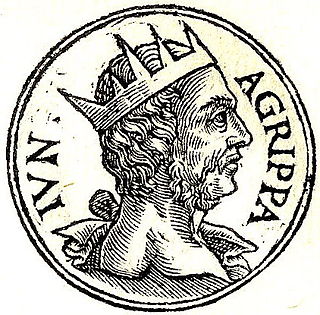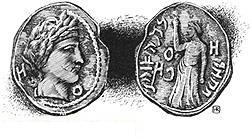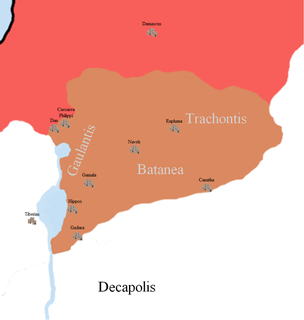 W
WAbinergaos I, also known as Abinerglus, was the king of Characene during the second decade of the Christian era.
 W
WHerod Agrippa II officially named Marcus Julius Agrippa and sometimes shortened to Agrippa, was the eighth and last ruler from the Herodian dynasty. He was the fifth member of this dynasty to bear the title of king, but he reigned over territories outside of Judea only as a Roman client. Agrippa was overthrown by his Jewish subjects in 66 and supported the Roman side in the First Jewish–Roman War.
 W
WHerod Antipater, known by the nickname Antipas, was a 1st-century ruler of Galilee and Perea, who bore the title of tetrarch and is referred to as both "Herod the Tetrarch" and "King Herod" in the New Testament, although he never held the title of king. He is widely known today for accounts in the New Testament of his role in events that led to the executions of John the Baptist and Jesus of Nazareth.
 W
WHerod Archelaus was ethnarch of Samaria, Judea, and Idumea, including the cities Caesarea and Jaffa, for a period of nine years. Archelaus was removed by Roman Emperor Augustus when Judaea province was formed under direct Roman rule, at the time of the Census of Quirinius. He was the son of Herod the Great and Malthace the Samaritan, and was the brother of Herod Antipas, and the half-brother of Herod II. Archelaus came to power after the death of his father Herod the Great in 4 BC, and ruled over one-half of the territorial dominion of his father.
 W
WAretas IV Philopatris was the King of the Nabataeans from roughly 9 BC to AD 40.
 W
WArtabanus II, incorrectly known in older scholarship as Artabanus III, was King of Kings of the Parthian Empire from 12 to 38/41, with a one-year interruption. He was the nephew and successor of Vonones I. His father was a Dahae prince, whilst his mother was a daughter of the Parthian King of Kings Phraates IV
 W
WAttambelos III of Characene was a king of Characene who ruled from approximately 37/38 to 44/45AD. His rule is known only by the coins he minted. The presence of these coins as far afield as Oman and southern Arabia indicates that his rule saw a time of extensive trade.
 W
WAttambelos IV of Characene was a first century ruler of the state of Characene, centered on the northern end of the Persian Gulf. His capital was probably Charax.
 W
WAttambelos V of Characene was a ruler of the state of Characene who ruled from 64/65–73/74 but who is known only from the coins he minted.
 W
WAristobulus of Chalcis was a son of Herod of Chalcis and his first wife Mariamne. Herod of Chalcis, ruler of Chalcis in Iturea, was a grandson of Herod the Great through his father, Aristobulus IV. Mariamne was a granddaughter of Herod the Great through her mother, Olympias; hence Aristobulus was a great-grandson of Herod the Great on both sides of his family.
 W
WChuldu or Huldu, was a Queen of the Nabataeans, spouse and co-ruler of Aretas IV.
 W
WHerod Agrippa, also known as Herod or Agrippa I, was a King of Judea from AD 41 to 44. He was the last ruler with the royal title reigning over Judea and the father of Herod Agrippa II, the last king from the Herodian dynasty. The grandson of Herod the Great and son of Aristobulus IV and Berenice, he is the king named Herod in the Acts of the Apostles 12:1: "Herod (Agrippa)".
 W
WHerod II was the son of Herod the Great and Mariamne II, the daughter of Simon Boethus the High Priest. For a brief period he was his father's heir. Some writers call him Herod Philip I.
 W
WHerod of Chalcis, also known as Herod V, listed by the Jewish Encyclopedia as Herod II, was a son of Aristobulus IV, and the grandson of Herod the Great, Roman client king of Judaea. He was the brother of Herod Agrippa I and Herodias.
 W
WIzates II was king of the Parthian client kingdom of Adiabene from approximately 30 to 54. He is notably for converting to Judaism. He was the son of Queen Helena of Adiabene and Monobaz I of Adiabene. Queen Helena was also said to be the wife of King Abgarus of Edessa and thus the queen of Edessa too.
 W
WMalichus II was ruler of Nabatea from 40 to 70 AD.
 W
WMusa, also known as Thea Musa, was queen of the Parthian Empire from 2 BC to 4 AD. Originally an Italian slave-girl, she was given as a gift to the Parthian monarch Phraates IV by the Roman Emperor Augustus. She quickly became queen and a favourite of Phraates IV, giving birth to Phraataces. In 2 BC, she had Phraates IV poisoned and made herself, along with Phraates V, the co-rulers of the empire. Their reign was shortlived; they were forced to flee to Rome after being deposed by the Parthian nobility, who crowned Orodes III as king.
 W
WOrodes III was king of the Parthian Empire from 4 to 6. Albeit he was an Arsacid, his lineage is unknown. He was raised to the throne by the nobility two years after the death of the previous co-rulers, Phraates V and Musa. Information regarding the brief reign of Orodes III is lacking. He was killed after a reign of two years. He was succeeded by Vonones I.
 W
WPhilip the Tetrarch, sometimes called Herod Philip II by modern writers was the son of Herod the Great and his fifth wife, Cleopatra of Jerusalem. Philip II was born c. 26 BCE. He was a half-brother of Herod Antipas and Herod Archelaus; and should not be confused with Herod II, whom some writers call Herod Philip I.
 W
WMarcus Antonius Polemon Pythodoros, also known as Polemon II of Pontus and Polemon of Cilicia, was a prince of the Bosporan, Pontus, Cilicia, and Cappadocia. He served as a Roman Client King of Pontus, Colchis, and Cilicia.
 W
WShaqilath was a queen of the Nabataeans.
 W
WShaqilath II, was a queen of the Nabataeans.
 W
WRabel II Soter (ar-Rabil) was the last ruler of the Nabataean Kingdom, ruling from 70 to 106.
 W
WTheonesios II of Characene was a 1st century king of the kingdom of Characene located at the mouth of the Tigris-Euphrates rivers during antiquity. He ruled for only a few months in 46/47AD. His rule is known only by the coins he minted.
 W
WTheonesios III of Characene was a king of Characene who ruled from approximately 52AD. His rule is known only by the coins he minted.
 W
WVonones II was a Parthian prince who ruled as king of Media Atropatene and briefly as king of the Parthian Empire.